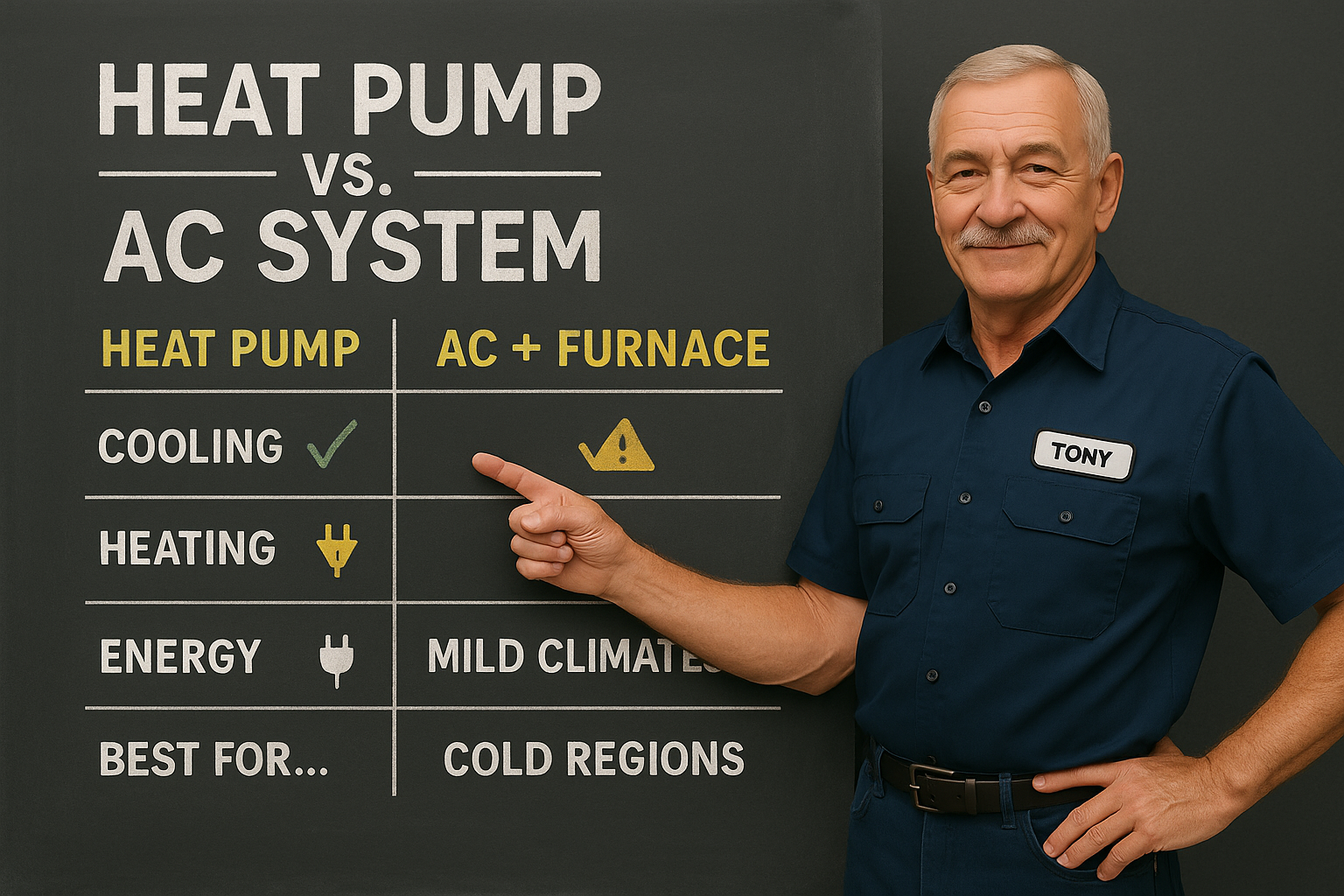👋 Hey, Tony here…
A lot of folks ask me:
“What’s the difference between a heat pump and an air conditioner? And which one’s better for my home?”
Short answer? It depends on your climate, fuel source, and goals. But don’t worry—I’ll help you figure out what fits.
Let’s dive into how heat pumps and air conditioners compare—backed by real data and expert sources.
🧊 What’s an Air Conditioner?
A central air conditioner uses refrigerant to pull heat from your indoor air and release it outdoors. It cools your house, but can’t heat it—you’ll need a separate furnace for that.
-
Great for cooling-only systems
-
Usually paired with a gas furnace in colder regions
-
Ideal if you already have a full HVAC setup
🧾 Reference:
U.S. Department of Energy – Central Air Conditioners
Explains how AC units work and what homes they’re best for.
🔁 What’s a Heat Pump?
A heat pump is a two-in-one system: it cools in summer and heats in winter by reversing the refrigerant flow.
-
Can replace both AC + furnace
-
Uses electricity only—no gas or propane
-
Ideal for mild to moderate climates (think Southern U.S.)
🧾 Reference:
ENERGY STAR – Heat Pumps 101
Overview of how heat pumps operate and when they outperform traditional HVAC.
⚖️ Heat Pump vs. AC + Furnace: Quick Comparison
| Feature | Heat Pump | AC + Furnace |
|---|---|---|
| Cooling performance | ✅ Excellent | ✅ Excellent |
| Heating performance | ⚠️ Limited in freezing temps | 🔥 Powerful (gas/oil heat) |
| Energy source | Electricity only | Gas + Electricity |
| Year-round use | ✅ Yes (heating & cooling) | ❌ AC only, furnace needed separately |
| Ideal for... | Mild/moderate climates | Cold regions |
🧾 Reference:
Trane – Heat Pump vs. AC: Which Is Right?
Excellent breakdown from a major HVAC manufacturer with climate-based advice.
🌎 Climate Matters—A Lot
Heat pumps are highly efficient in warmer climates, but lose performance as temps drop below freezing.
That’s why many cold-climate homes stick with:
-
✅ AC + high-efficiency gas furnace
-
✅ Or dual-fuel systems (heat pump + furnace backup)
Tony Tip: “If you live in Florida, Georgia, or Texas—a heat pump is a no-brainer. In Minnesota? You’ll need backup heat.”
🧾 Reference:
National Renewable Energy Lab – Cold-Climate Heat Pump Performance
NREL research showing how new heat pump models perform in freezing temps.
💡 Efficiency and Savings
✅ Both systems can qualify for federal tax credits if they meet SEER2/EER2 and HSPF2 thresholds
✅ Heat pumps may offer higher year-round energy savings if used as primary heat
✅ AC + furnace setups may last longer in northern states due to less wear on components
🧾 Reference:
ENERGY STAR – 25C HVAC Tax Credits
Covers qualifying equipment, rebate amounts, and energy efficiency thresholds.
🧭 Final Word From Tony
“It’s not about which system is better—it’s about what’s better for your home.”
Choose a heat pump if:
-
You live in a warm or moderate climate
-
Your home is electric-only (no gas service)
-
You want year-round comfort from one system
Choose an AC + furnace if:
-
You live in a colder region
-
You already have a natural gas furnace
-
You want the strongest heating performance available
Need help choosing or upgrading? I’m happy to match you with the right Goodman system—or explain if a heat pump is worth the switch in your zip code.
In the next topic you will read about: SEER2 vs SEER: What’s the Real Difference? Tony breaks down why SEER2 replaced SEER—and what it means for your next HVAC system.







